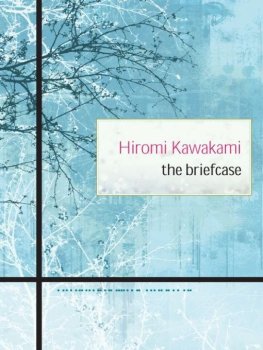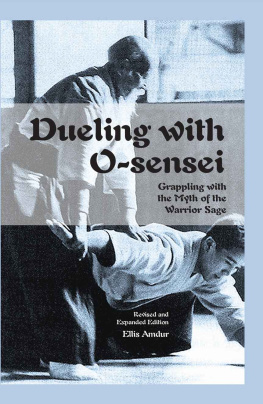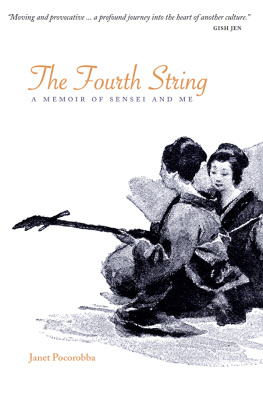Hiromi Kawakami
THE BRIEFCASE
Translated by Allison Markin Powell
The Moon and the Batteries
HIS FULL NAME was Mr. Harutsuna Matsumoto, but I called him Sensei. Not Mr. or Sir, just Sensei.
He was my Japanese teacher in high school. He wasnt my homeroom teacher, and Japanese class didnt interest me much, so I didnt really remember him. Since graduation, I hadnt seen him for quite a while.
Several years ago, we sat beside each other at a crowded bar near the train station, and after that, our paths would cross every now and then. That night, he was sitting at the counter, his back so straight it was almost concave.
Taking my seat at the counter, I ordered Tuna with fermented soybeans, fried lotus root, and salted shallots, while the old man next to me requested Salted shallots, lotus root fries, and tuna with fermented soybeans almost simultaneously. When I glanced over, I saw he was staring right back at me. I thought to myself, Why do I know his face ? Sensei spoke.
Excuse me, are you Tsukiko Omachi?
Stunned, I nodded in response.
Ive spotted you here sometimes, Sensei said.
Is that right? I answered vaguely, still looking at him. His white hair was carefully smoothed back, and he was wearing a starched white shirt with a gray vest. On the counter in front of him, there was a bottle of sak, a plate with a strip of dried whale meat, and a bowl that had a bit of mozuku seaweed left in it. I wondered who this old man was who shared the same taste as me, and an image of him standing at a teachers podium floated through my mind.
Sensei had always held an eraser in his hand when writing on the blackboard. He would write something in chalk, like the first line of The Pillow Book by Sei Shonagon: IN SPRING IT IS THE DAWN THAT IS MOST BEAUTIFUL. And then, not five minutes later, he would erase it. Even when he turned to lecture to his students, he would still hold on to the eraser, as if it was attached to his sinewy left hand.
Its unusual to see a woman alone in a place like this, Sensei said as he delicately poured vinegared miso over the last morsel of dried whale and brought it to his lips with his chopsticks.
Yes, I replied, pouring beer into my glass. I had identified him as one of my high school teachers, but I still couldnt recall his name. As I drained my glass, part of me marveled that he could remember the name of a particular student, and part of me was puzzled.
Didnt you wear your hair in braids during high school?
Yes.
I recognized you as soon as I saw you here.
Oh.
Did you recently turn thirty-eight this year?
Im still only thirty-seven.
Im sorry, I beg your pardon.
Not at all.
I looked you up in the register and the yearbook, just to be sure.
I see.
You look just the same, you know.
You look just as well, Sensei. I called him Sensei to hide the fact that I didnt know his name. He has been Sensei ever since.
That evening, we drank five bottles of sak between us. Sensei paid the bill. The next time we saw each other at the bar and drank together, I treated. The third time, and every time thereafter, we got separate checks and paid for ourselves. Thats how it went. We both seemed to be the type of person who liked to stop in every so often at the local bar. Our food preferences werent the only things we shared; we had a similar rhythm, or temperament. Despite the more than thirty-year difference in our ages, I felt much more familiar with him than with friends my own age.
I WENT TO Senseis house several times. Every so often we would leave our usual bar to drink at a second place, and then we would go our separate ways home. But the few times we got as far as a third or fourth bar, we inevitably ended up having the final drink at Senseis house.
I live nearby, why dont you come over? Sensei said the first time he invited me to his home, and I felt a twinge of reticence. I had heard that his wife had passed away. The idea of spending time at a widowers home was slightly off-putting, but once Ive started drinking, not much can stop me, so I went along.
It was more cluttered than I had imagined. I had thought his place would be immaculate, but there were things piled up in every dark corner. Just off the hall, a carpeted room with an old sofa was absolutely silent and gave no hint of the books and writing paper and newspapers strewn about the adjacent tatami room.
Sensei pulled out the low dining table and took a large bottle of sak from among the things in a corner of the room. He filled two different-sized teacups to the brim.
Please have a drink, Sensei said before he headed off to the kitchen. The tatami room gave on to a garden. Only one of the rain shutters was open. Through the glass door I could see the vague shape of tree branches. Since they were not in flower, I couldnt tell what kind of trees they were. Ive never known much about plants.
What kind of trees are those in the garden? I asked Sensei as he carried in a tray with flakes of salmon and kaki no tane rice crackers.
Theyre all cherry trees, he answered.
All cherry trees?
Yes, all of them. My wife loved them.
They must be beautiful in the spring.
They are crawling with insects. In the fall there are dead leaves all over the place, and in winter the bare branches are bleak and dreary, Sensei said without any particular distaste.
The moon is out tonight. A hazy half-moon hung high in the sky.
Sensei took one of the rice crackers and tilted his teacup as he refilled it with sak. My wife was the kind of person who didnt think things through.
I see.
She just loved the things she loved, and hated the things she hated.
Oh.
These kaki no tane are from Niigata. Theyre good and spicy.
The piquant burn of the crackers really did go quite well with sak. I sat there silently for a while, eating them with my fingers. Something fluttered in a treetop outside. It must have been a bird. I heard a faint chirping and the sound of the leaves on the branches rustling for a moment, and then it was quiet again.
Are there birds nests? I asked, but there was no answer. I turned around, and Sensei was gazing at a newspaper. Not todays paper, but one that he had randomly taken from the ones strewn about. He was intently reading a page from the foreign news service that had a photograph of a woman in a bathing suit. He seemed to have forgotten that I was there.
Sensei, I called, but still there was no response. He was completely absorbed.
Sensei, I said again in a loud voice. Sensei looked up.
Would you like to read the newspaper, Tsukiko? he asked me abruptly. Without waiting for me to reply, Sensei laid the open paper on the tatami, slid open the fusuma, and went into the next room. He came back carrying several things he had taken from an old bureau. They were small pieces of pottery. Sensei made a few trips back and forth between this and the next room.
Yes, here they are. Sensei crinkled the corners of his eyes, carefully lining up the ceramics on the tatami. They each had a handle, a lid, and a spout. Look at them!
I see. But what were they? I stared at them, thinking to myself that I had seen something like these before. They were all roughly made. Were they teapots? But they were so small.
These are railway teapots, Sensei said.
Railway teapots?
These are from trips I took. I bought box lunches at the station or on the train that came with these teapots. Now the teapots are plastic, but they used to sell them with ceramic railway teapots like these.
There were more than a dozen railway teapots lined up. Some were amber-colored, some were other pale shades. They were all different shapes. This one had a large spout, that one a big handle, this pot had a tiny lid, that pot was fat and round.



![Hiromi Kavakami - Strange Weather in Tokyo [= The Briefcase]](/uploads/posts/book/836028/thumbs/hiromi-kavakami-strange-weather-in-tokyo-the.jpg)







![Randy Mosher - Beer for all seasons : [a through-the-year guide to what to drink and when to drink it]](/uploads/posts/book/74958/thumbs/randy-mosher-beer-for-all-seasons-a.jpg)